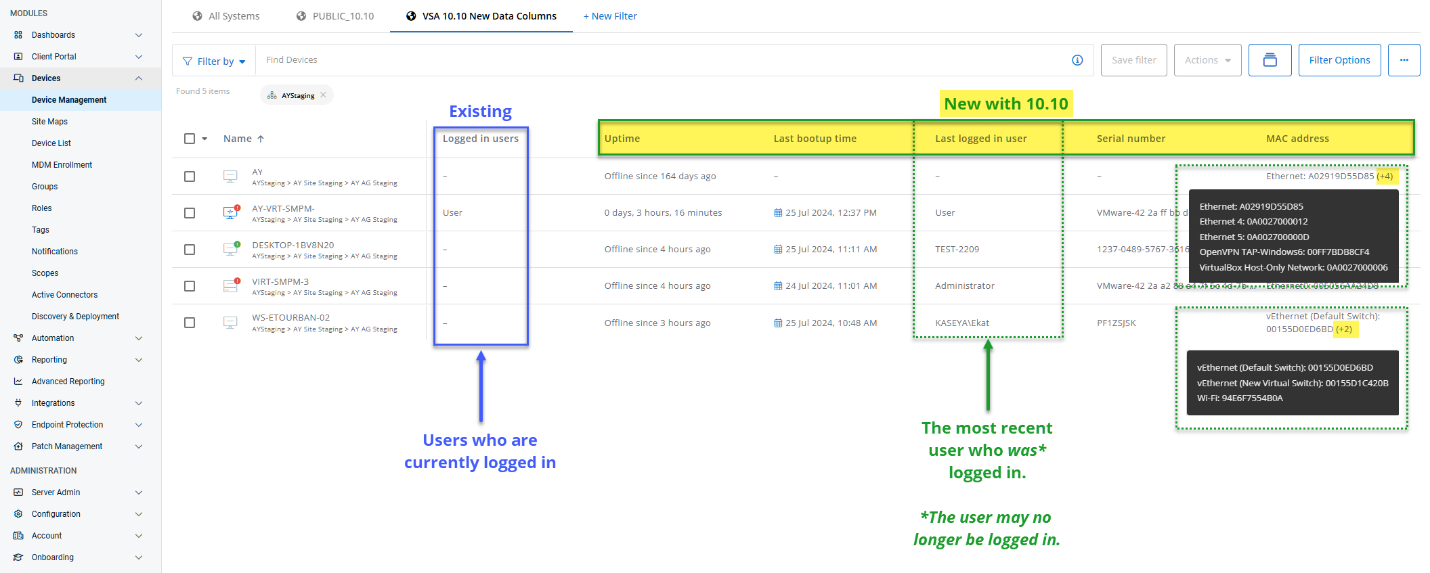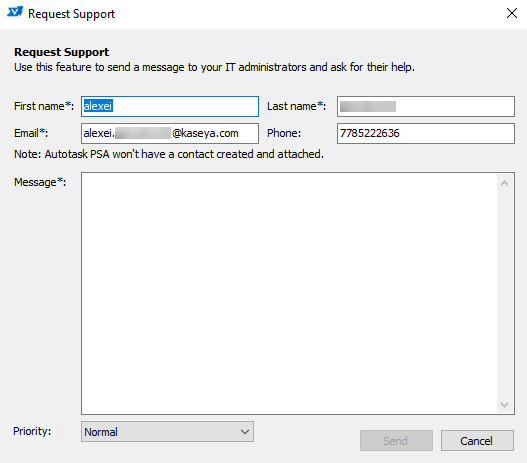VSA 10: Version 10.10 release notes
NOTE During release deployment, all active web application sessions will be disconnected, and customers will need to log in again at the beginning of the maintenance window. SaaS customers will be informed of their maintenance window via status.kaseya.net. Deployment for SaaS customers is expected to roll out in stages based on region. On-Premises deployment will follow a week later.
General Availability: August 12, 2024
Key feature enhancements
Device Management
Data points have been added to assist with triage and information gathering when working with devices:
Uptime
- Supported on all devices.
- Column added to Filter Options on the Device Management page and to the All Systems default filter.
Last logged in user
- Updated each time a new user logs in.
- Supported for Windows and macOS agent devices (Linux and BSD will be added in a later release).
- Column added to Filter Options on the Device Management page and to the All Systems default filter.
- Searchable using the top navigation search bar and within the filter on the Device Management page.
Last bootup time
- Supported on all devices with the agent installed (Windows, macOS, Linux, BSD).
- Column added to Filter Options on the Device Management page and to the All Systems default filter.
Serial number
- Supported for Windows and macOS agent devices (Linux and BSD will be added in a later release).
- Column added to Filter Options on the Device Management page and to the All Systems default filter.
- Searchable using the top navigation search bar and within the filter on the Device Management page.
MAC address
- Supported for Windows and macOS agent devices (Linux and BSD will be added in a later release).
- Column added to Filter Options on the Device Management page and to the All Systems default filter.
- Searchable using the top navigation search bar and within the filter on the Device Management page.
MDM
The MDM Configuration profiles forms are now dynamic. Non-relevant fields are hidden based on the context, providing a cleaner and more intuitive user experience.
VSA 10 now handles the sleep state of mobile devices. Configuration profile provisioning will occur once the device wakes up, ensuring seamless and timely updates.
Automation
Execute Workflow action added to workflows
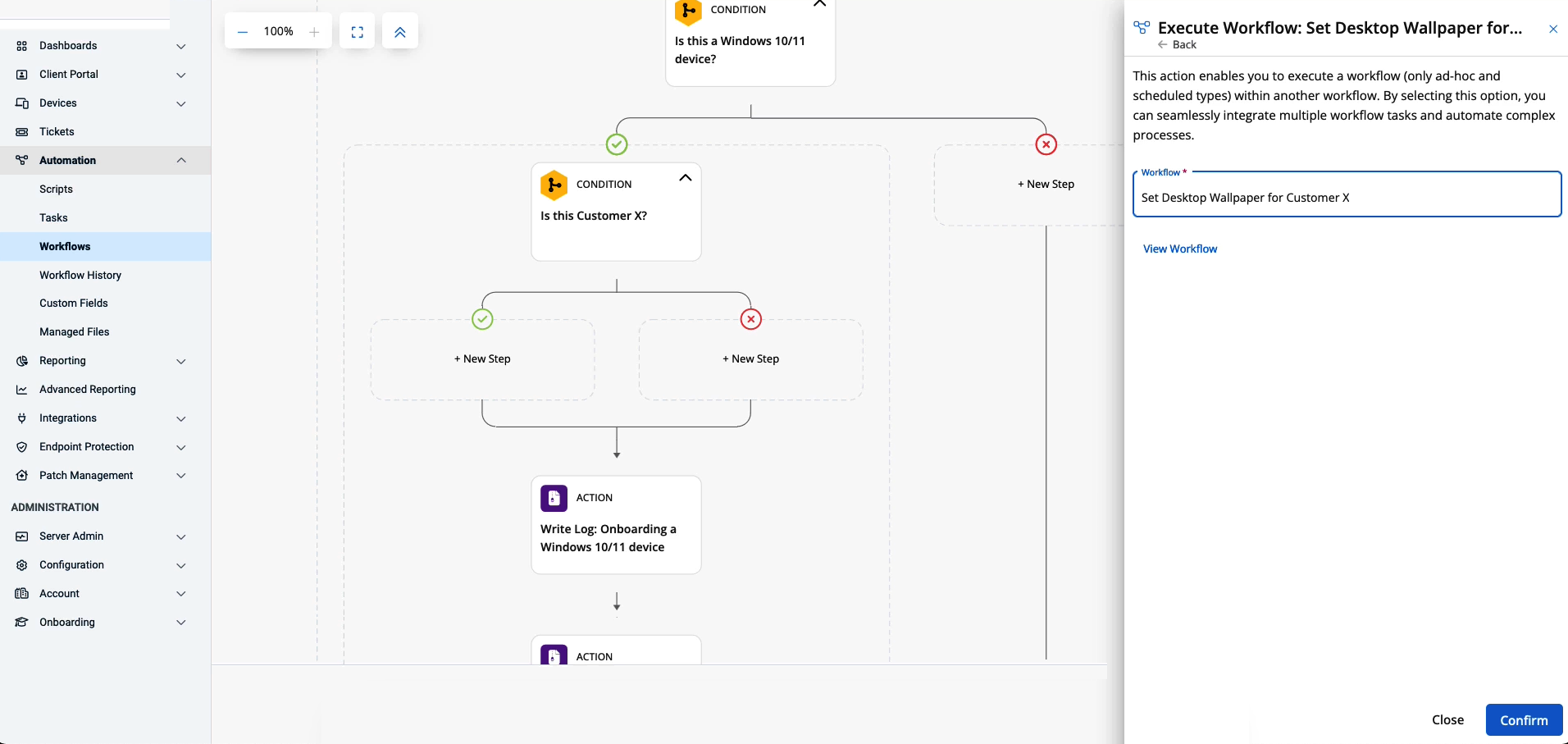
With this new feature, any active Ad-hoc and Scheduled workflow can be executed from within another workflow. The child workflow will be executed from the parent workflow’s context, overriding its currently assigned context. On the Workflow History page, you are able to toggle between the parent and child workflow to visually follow the execution route.
This enhancement allows for greater flexibility and customization of complex workflow executions.
The following video demonstrates running a Set Desktop Wallpaper workflow within the System Registered notification targeting Windows 10 computers for a specific customer.
Importing .flw workflow files
VSA 10 introduces the ability to import workflow .flw flat files created using the Export Workflow feature. Now, any existing workflow canvas can be exported and imported on an ad-hoc basis to any VSA 10 tenant. This new functionality enables VSA 10 admins to easily share and import workflow templates between tenants and within the Kaseya community, significantly boosting productivity.
The exported FLW files include the entire canvas structure complete with workflow actions and conditions. When importing an FLW file into a VSA 10 tenant, the canvas will be recreated with some minor manual adjustments (if present during the import process) before saving the workflow.
NOTE Custom fields must be created before importing or remapped to any existing field.
NOTE Managed files must be uploaded manually before importing or remapped to any existing file.
You will find the Export workflow as .flw action when hovering over any existing workflow in the list. To import, click Actions > Import Workflow and select the FLW file to be imported.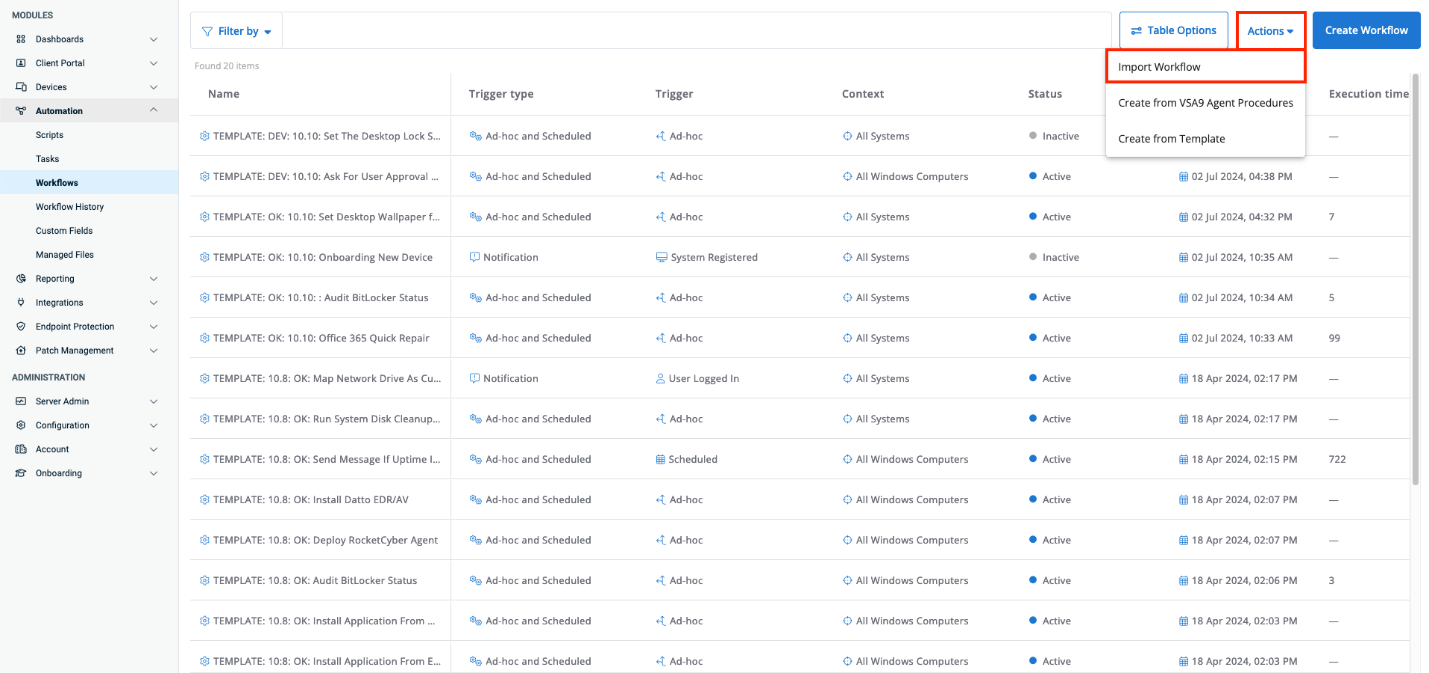
Integrations
PSA ticketing from the system tray icon
The PSA ticketing option from the system tray has been enhanced. VSA 10 now associates the contact who created the ticket and the device connected to it.
The following fields are now available when creating a support ticket:
- First name*
- Last name*
- Email*
- Phone
- Priority (same list of priorities as in VSA 10)
NOTE *These fields are required.
The PSA ticket will be associated with a PSA contact by the email address that is provided in the request:
- BMS/Vorex: A contact will be created and associated with the ticket if no contact is associated with the email address. If the contact already exists, it will be associated with the ticket.
- ConnectWise: A contact will be created and associated with the ticket if no contact is associated with the email address. If the contact already exists, it will be associated with the ticket.
- Autotask: If the contact already exists, it will be associated with the ticket, but no association will occur if no contact already exists. If the contact existed before requesting support, the first name, last name, and phone number are not updated; the contact is detected by email address only.
- All PSA integrations: Tickets are only created, not updated.
Creating a ticket from the system tray should be enabled first via the User Session profile type and then applied via a policy.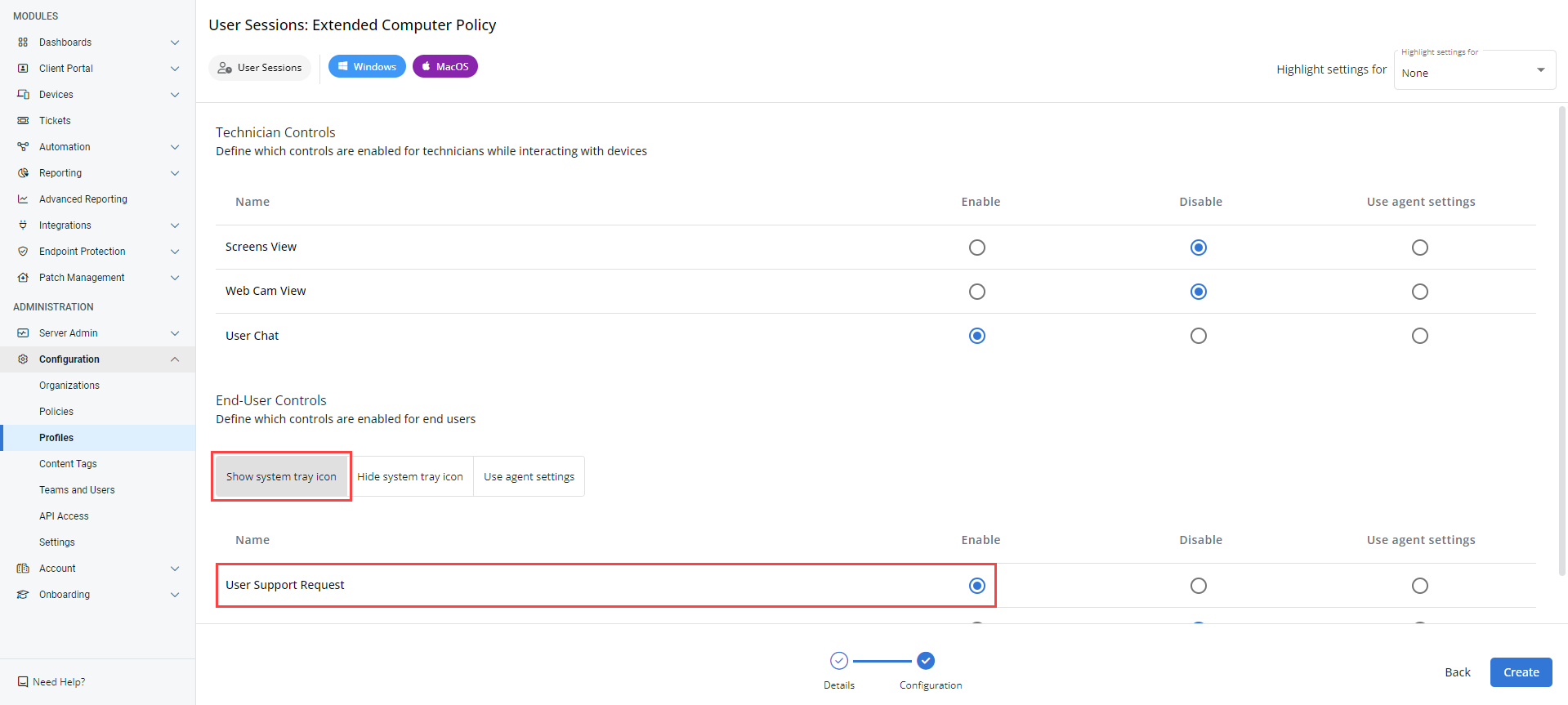
You will be able to request support and create a PSA ticket from the system tray icon. The contact and device will be associated with the ticket. When hovering over the system tray icon, it will display the device name (hostname).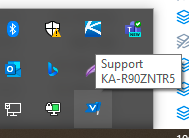
Create/Update PSA Ticket actions available for notification workflow
The workflow actions Create PSA Ticket and Update PSA Ticket have been reenabled and enhanced with the following behavior:
- Notification-triggered and Ad-hoc and Scheduled workflows for any integrated PSA.
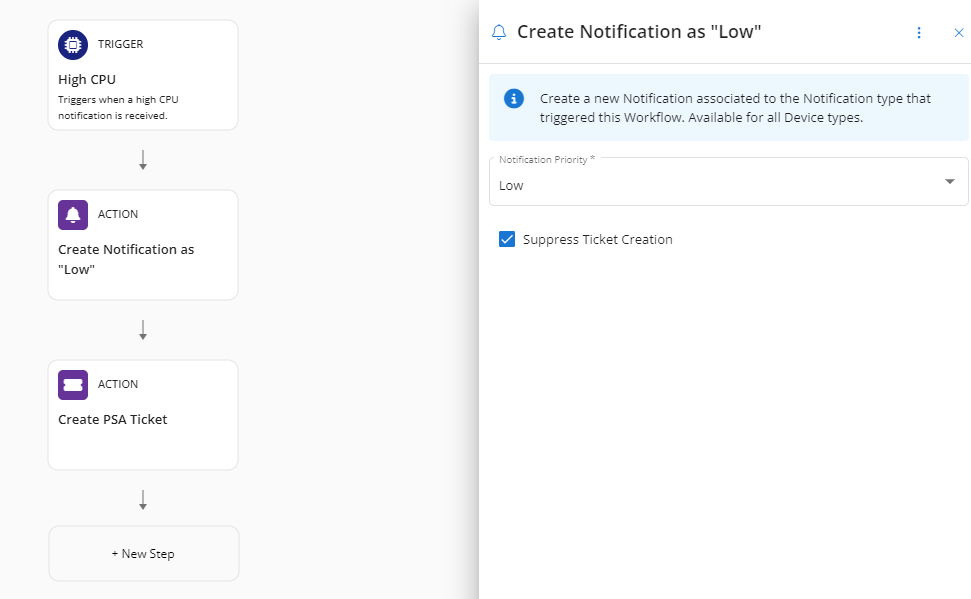
- Create PSA Ticket and Update PSA Ticket actions are not available for deviceless workflows.
- For ticket creation and updating, all technical fields are optional, and values are taken implicitly based on the default ticketing configuration on BMS/Vorex, Autotask, or ConnectWise.
- If the PSA integration is removed, the Create PSA Ticket and Update PSA Ticket actions in existing workflows will fail.
From the notification created in VSA 10 based on the trigger notification configured in the workflow, you can open the created PSA ticket (via Devices > Notifications).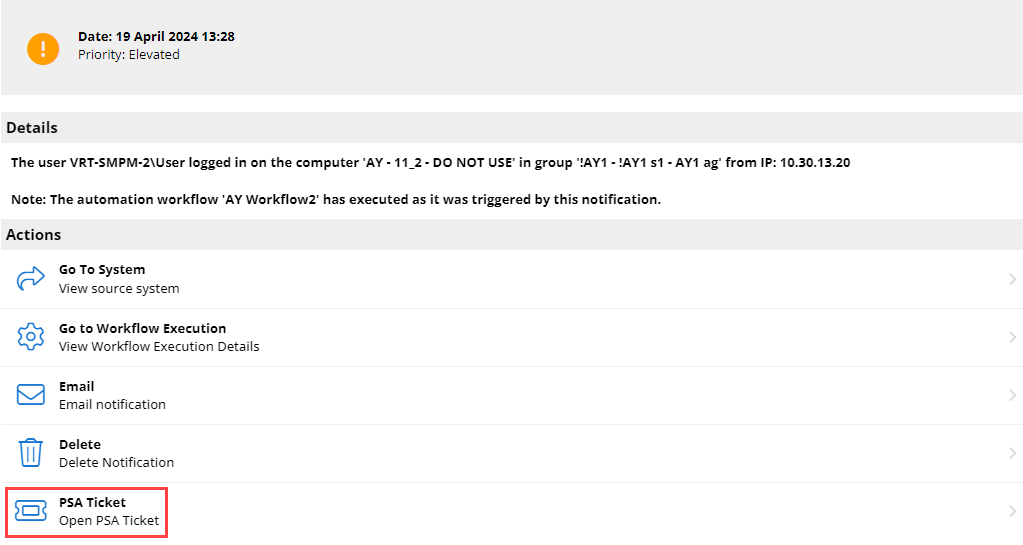
Evidence of Compliance feature
Compliance Manager GRC allows you to import data from other Kaseya products you frequently use directly into your assessment. This includes technical data such as proof of patch management, backups for endpoints, and evidence of two-factor authentication.
When you import this data, you can review evidence of compliance as you answer assessment questions for the Rapid Baseline, Controls, and/or Requirements Assessments. Evidence of Compliance data will automatically be mapped to the relevant controls and available to download in reports.
- Evidence description: Proof of patch management from VSA 10
- Evidence metrics:
- Device hostname
- Device IP address (comma-separated if multiple)
- Device MAC addresses (comma-separated)
- Agent version
- Agent last seen date/time
- Last logged-in user
- Patching information
- Missing patch count (0 if no patch policies are assigned to a device; number of approved patches otherwise)
- Patch status
- No Patch Policy: no patch policy assigned to device
- Fully Patched: device's missing patch count = 0
- Missing Patches: device's missing patch count > 0
To learn how to import Evidence of Compliance data, refer to the Compliance Manager GRC Help system.
The URL and Path fields of the Get URL action now support #variables.
Other enhancements
- The End User License Agreement (EULA) has been updated for product installers.
- The local Agent Manager application tabs and settings that were previously deprecated have been reinstated.
API
- The existing Get Assets endpoint now includes much more information about each device, including data such as installed software and installed and available patches. Data is now filterable, including the ability to omit available information sections.
- New API endpoints have been added for organizations, sites, and groups to allow creation and updating of these objects.
Patch Management
- The Patch Status page now supports filtering by operating system (product). This enhancement allows you to narrow down patches by the operating system on which a given patch was discovered.
Fixes
Advanced Reporting
- The RMM - ExecutiveNotifications dataset no longer fails to return results in the Message column.
Automation
- After selecting a Scope value in a condition and saving the workflow, the value is no longer displayed as null.
- When running an Ad-hoc and Scheduled workflow from the Device Management page, and the Skip if offline trigger toggle is turned off in the workflow, the prompt that the workflow will be skipped if offline no longer appears.
Devices
- The Wake Up command now works as expected to turn on offline endpoints.
- For certain Windows servers, the issue that prevented navigating to Windows Updates to view and install software updates has been fixed.
- Users are no longer able to enroll devices in groups they do not have access to according to their team permissions.
- When provisioned licenses are available, devices with the same MAC address can now be successfully enrolled without indication that the license limit is exceeded.
Integrations
- When a mapped device is removed from VSA 10, the mapping and the associated asset in ConnectWise are now successfully removed from the integration.
Fixes for on-premises VSA 10 installations
- Upon enabling Log In with KaseyaOne, the administrator is now successfully redirected to the KaseyaOne login page.
- Users logged in to VSA 10 with KaseyaOne are no longer automatically logged out when editing profiles in a policy.
Monitoring and Notifications
- When the Send a notification when the computer is offline policy setting is enabled while all settings related to an online device are disabled, notifications are no longer sent when a targeted device comes back online.
- The Pending Reboot notification is no longer improperly deleted and regenerated without being resolved.
Policies and Profiles
- When the Autotask Integration is configured, the Disable Autotask profile setting now works as expected.
Remote Control
- The pop-up approval request no longer fails to appear on a macOS device that is assigned a policy configured to request permission to initiate Remote Control sessions.
Teams and Users
- Long organization names are now properly displayed on this page.
Upgrade Wizard
- The Failed to load organizations - contact support error message no longer appears.
Windows Agent
- Using the GPO deployment method with nested OUs now works as expected to deploy the agent on the endpoints in Active Directory.
